
|
Astronomy Picture Of the Day (APOD)
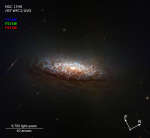 Hubble s NGC 1546
Hubble s NGC 1546
20.06.2024
Returning to science operations on June 14, the Hubble Space Telescope used its new pointing mode to capture this sharp image of spiral galaxy NGC 1546. A member of the Dorado galaxy group, the island universe lies a mere 50 million light-years away.
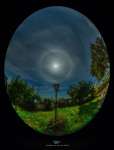 Sandy and the Moon Halo
Sandy and the Moon Halo
19.06.2024
Last April's Full Moon shines through high clouds near the horizon, casting shadows in this garden-at-night skyscape. Along with canine sentinel Sandy watching the garden gate, the wide-angle snapshot also captured the bright Moon's 22 degree ice halo. But June's bright Full Moon will cast shadows too.
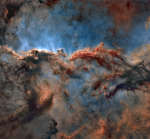 APOD: 2024 June 19 Б NGC 6188: Dragons of Ara
APOD: 2024 June 19 Б NGC 6188: Dragons of Ara
18.06.2024
Do dragons fight on the altar of the sky? Although it might appear that way, these dragons are illusions made of thin gas and dust. The emission nebula NGC 6188, home to the glowing...
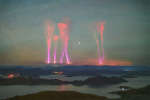 APOD: 2024 June 18 Б Gigantic Jets over Himalayan Mountains
APOD: 2024 June 18 Б Gigantic Jets over Himalayan Mountains
17.06.2024
Yes, but can your thunderstorm do this? Pictured here are gigantic jets shooting up from a thunderstorm last week toward the Himalayan Mountains in China and Bhutan. The composite image captured four long jets that occurred only minutes apart.
 APOD: 2024 June 17 Б Ou4: The Giant Squid Nebula
APOD: 2024 June 17 Б Ou4: The Giant Squid Nebula
16.06.2024
Squids on Earth aren't this big. This mysterious squid-like cosmic cloud spans nearly three full moons on planet Earth's sky. Discovered in 2011 by French astro-imager Nicolas Outters, the Squid Nebula's bipolar shape is distinguished here by the telltale blue emission from doubly ionized oxygen atoms.
 APOD: 2024 June 16 Б Animation: Black Hole Destroys Star
APOD: 2024 June 16 Б Animation: Black Hole Destroys Star
15.06.2024
What happens if a star gets too close to a black hole? The black hole can rip it apart -- but how? It's not the high gravitational attraction itself that's the problem -- it's the difference in gravitational pull across the star that creates the destruction.
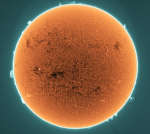 Prominences and Filaments on the Active Sun
Prominences and Filaments on the Active Sun
14.06.2024
This colorized and sharpened image of the Sun is composed of frames recording emission from hydrogen atoms in the solar chromosphere on May 15. Approaching the maximum of solar cycle 25, a multitude of active regions and twisting, snake-like solar filaments are seen to sprawl across the surface of the active Sun.
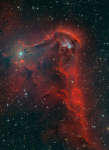 RCW 85
RCW 85
13.06.2024
From the 1960 astronomical catalog of Rodgers, Campbell and Whiteoak, emission region RCW 85 shines in southern night skies between bright stars Alpha and Beta Centauri. About 5,000 light years distant, the hazy interstellar cloud of glowing hydrogen gas and dust is faint.
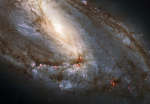 Messier 66 Close Up
Messier 66 Close Up
12.06.2024
Big, beautiful spiral galaxy Messier 66 lies a mere 35 million light-years away. The gorgeous island universe is about 100 thousand light-years across, similar in size to the Milky Way. This Hubble Space Telescope close-up view spans a region about 30,000 light-years wide around the galactic core.
 APOD: 2024 June 12 Б Aurora over Karkonosze Mountains
APOD: 2024 June 12 Б Aurora over Karkonosze Mountains
11.06.2024
It was the first time ever. At least, the first time this photographer had ever seen aurora from his home mountains. And what a spectacular aurora it was. The Karkonosze Mountains in Poland are usually too far south to see any auroras.
|
January February March April May June July August September October November |
|||||||||||||||||||||||||||||||||||||||||||||||||